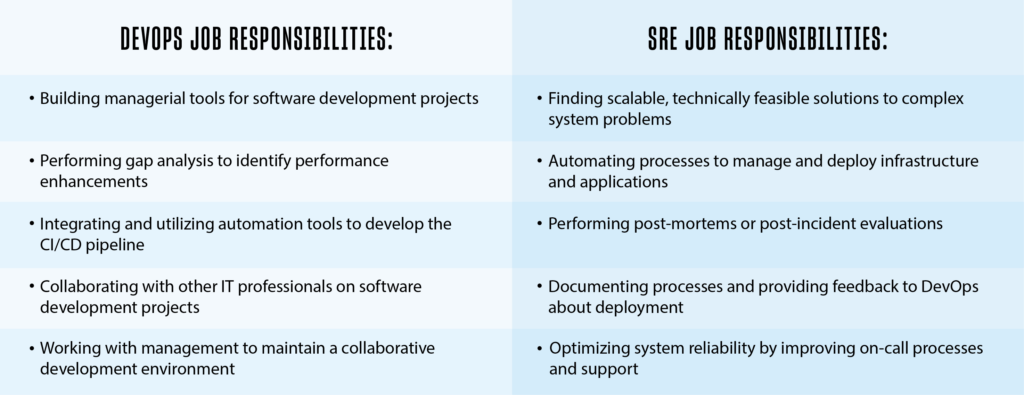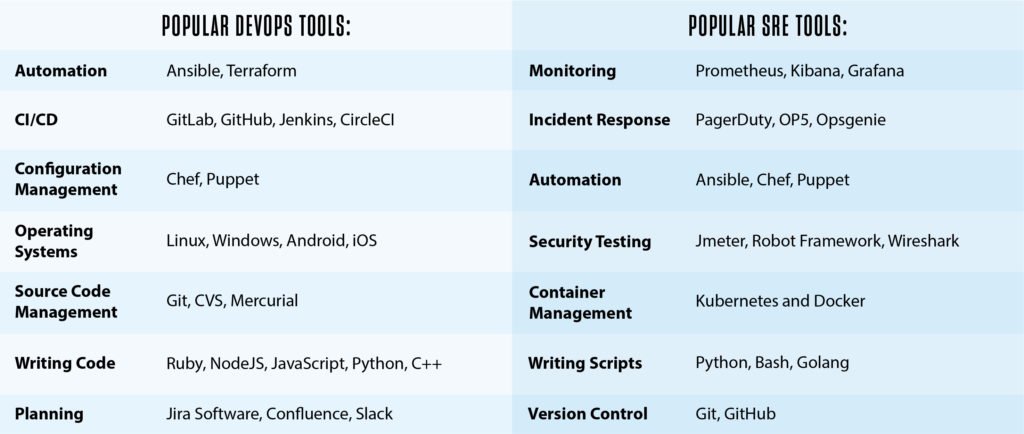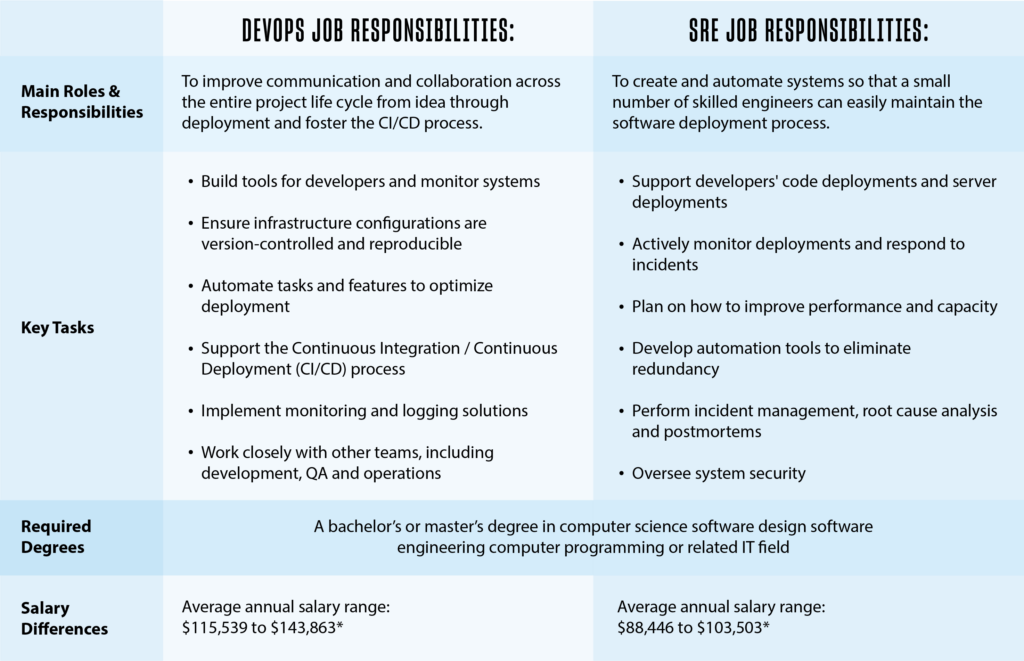While the roles of site reliability engineers (SREs) and DevOps engineers may appear similar, there are some important differences between how they work on projects. Both utilize similar skill sets and tools to optimize the software development process, though their focuses differ.
It’s not really an either/or question, or an issue of SRE vs. DevOps. Many consider SRE to be an essential component of DevOps. While DevOps is a development methodology and can be thought of as more philosophical, SRE is specifically about the practices of maintaining stability and automating processes to ensure efficiency.
If you’re thinking about either role as a career move, it’s important to understand the distinctions, as it’s your specific work style, personality and interests that could determine which career path would ultimately suit you better.
Here’s what you need to know about these increasingly popular and important positions
What Is SRE?
Site reliability engineering (SRE) utilizes software engineering principles to maintain and support IT infrastructure and system operations. First introduced by Google, SRE uses automation to enhance the reliability, efficiency and scalability of software systems. The major roles of SRE teams are to:
- Design scalable, technically sound solutions to solve operational challenges
- Proactively engineer automated solutions to improve deployments, monitoring and infrastructure management
- Be on-call to handle incidents, respond to outages and channel issues to the right people and teams
For a detailed look at site reliability engineering, read our blog post, “What is Site Reliability Engineering? SRE Explained.”
Who Can Be an SRE?
Anyone interested in becoming a site reliability engineer typically needs a strong foundation in computer science, coding skills and knowledge of various operating systems, automation tools and cloud computing architecture. Qualified candidates will have earned either a bachelor’s or master’s degree in computer science, software engineering or a related field and be proficient in networking, security and systems administration.
SRE is well suited for those who value stability, enjoy data-driven analysis and testing system resilience, are interested in finding the root causes of problems and don’t mind being on-call.
For a full look at the site reliability engineer job position, including specific responsibilities and required skills and experience, see our blog post, “How to Become a Site Reliability Engineer [+Career & Salary Guide].”
What Is DevOps?
DevOps is a subfield in IT that integrates software development (Dev) and operations (Ops) to create a unified approach. When development and operations are treated as separate processes, it can lead to communication gaps, delays and reduced platform stability. DevOps addresses these challenges by merging both processes, speeding up the software development life cycle (SDLC), facilitating continuous integration and continuous deployment (CI/CD) pipelines and enhancing testing and quality control through improved collaboration. Considered to be as much a mindset or philosophy as an approach to software development, DevOps is a continuous process meant to ensure faster, more reliable software releases with better consistency and platform stability.
Who Can Work In DevOps?
Anyone interested in becoming a DevOps engineer should have a balance of software development skills and the ability and confidence to work effectively with other teams and departments. Aspiring DevOps engineers should have experience with scripting languages, cloud computing concepts and operations-based tools. Qualified candidates will have earned either a bachelor’s or master’s degree in computer science, software design, software engineering or a related IT field.
The DevOps engineer role is suited to developers who thrive in fast-paced environments, enjoy automation, excel at multitasking and time management and can work across teams to collaborate with other programmers and engineers.
For a full look at the DevOps engineer job position, including specific responsibilities and required skills and experience, see our blog post, “How to Become a DevOps Engineer [+Career & Salary Guide].”
How Do the Responsibilities of SRE and DevOps Differ?
Before talking about the differences, it’s important to acknowledge the similarities and overlapping responsibilities. Both SREs and DevOps engineers:
- Are interested in breaking down silos
- Seek to automate repetitive tasks to improve efficiency
- Set up monitoring and logging systems to track application performance and detect issues
- May be involved in incident response and troubleshooting (though SREs often have a more defined role in this area)
The main difference in responsibilities is that DevOps work across teams to develop, design and deploy a product or application. They want to answer the question, “What do we need to do to solve a problem?”
SRE is more concerned about the implementation and deployment of an update or application. They are more interested in answering the question, “How can we successfully deploy and maintain the solution to this problem?”


What Are the Different Role Requirements for SRE and DevOps?
DevOps engineers play a larger role in overseeing the development cycle, focusing on solving development problems by building solutions aligned with business needs. They’re expected to streamline the development and deployment processes, reduce risk and increase development speed by breaking down silos. They prioritize using automation for tasks and features that will aid deployment.
SREs have a more specific role in operational problems like production failures, infrastructure issues and security issues. They proactively monitor and maintain system resilience, scalability and uptime to prevent problems. They’re expected to identify the root cause of any incident with deployment and report back to DevOps. Their priority for automation is to transform manual processes into automated tasks to enhance stability and efficiency.
How Do the Skill Sets of SRE and DevOps Differ?
DevOps engineers need to have a balance of software development skills and the ability to work effectively across teams. They need an in-depth understanding of the software development process throughout the continuous integration and continuous deployment pipelines. As they oversee the development process, they should enjoy writing software.
SREs prioritize technical knowledge, problem-solving and decision-making under pressure. SREs need the skills to automate tasks and features but also the insights to understand which tasks can be automated to reduce redundancies. While SREs require communication and project management skills to communicate across teams, they need an investigative mindset to diagnose system issues effectively.
What Are the Different Problems that SRE and DevOps Solve?
DevOps involves a higher-level approach more concerned with meeting business requirements by improving the development process. They are often tasked with moving software efficiently through the CI/CD pipeline and improving the speed of delivery for application changes, as their priority is to release small changes more often. DevOps will also address any failures that SREs can’t resolve on their own.
SRE focuses on maximizing a system’s reliability and stability, so engineers will employ predictive analytics, monitoring and modeling to identify problems with rollouts and deployment before they occur. The main concern of SREs is how to implement DevOps processes and principles while keeping systems stable. When failure does arise, SREs will perform a root cause analysis of what caused the failure and communicate it to DevOps.
What Are the Different Tools that SRE and DevOps Utilize?


How to Choose Between a Career in SRE or DevOps?
Both site reliability engineering and DevOps engineering are increasingly popular positions in IT that require similar levels of skill and experience but call for different ways of approaching the development process. To determine which may be a better fit for your career, start by considering your personality, work style and interests.
Do you enjoy automating complex tasks and thrive in fast-paced environments? Does the idea of looking for constant challenges to achieve rapid development sound exciting? As a DevOps engineer, you will experience a greater variety in your day-to-day tasks and engage in a great deal of cross-department collaboration. This position is ideal for those who can multitask well, are comfortable with interpersonal interactions and have excellent time-management skills.
Or, do you value thorough analysis and the challenge of ensuring system uptime? Do you enjoy analyzing data and making decisions to proactively address problems based on your findings? As an SRE, you’ll spend a lot of time troubleshooting and handling the occasional emergency, which can require working off-hours and being on-call. This position involves more solo work than DevOps engineers and is better suited to those who prefer a more systematic approach to work.
Be sure to compare the major elements of DevOps vs. SRE to see which aligns more closely with your interests and aspirations.


* According to salary.com as of March 2025
Helpful Certificates
— PMI Agile Certified Practitioner certification
— AWS Certified DevOps Engineer: Professional
— Microsoft Certified: DevOps Engineer Expert
— Puppet Certified Professional
— The SRE Foundation Certification from The DevOps Institute
— SRE Practitioner Certification from the DevOps Institute
— Reliability Engineer Certification from the American Society for Quality (ASQ)
— Intro to DevOps and Site Reliability Engineering from the Linux Foundation
Ultimately, there’s as much that binds these two positions as distinguishes them. And the truth is they work best when working in concert with each other. If you’re interested in either position, you’ll want to look for opportunities to boost your IT leadership skills through education and experience if you want to build a successful career in IT.